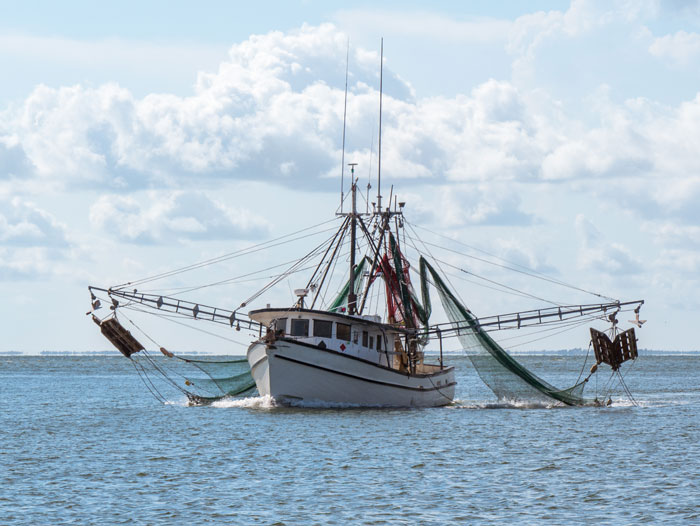Georgia Shrimp Season set to Open May 29, Close Oyster Harvest June 1
May 29, 2019 | 3 min to read

BRUNSWICK, Ga. – Georgia Department of Natural Resources Commissioner Mark Williams has announced that Georgia waters will open for commercial and recreational harvest of food shrimp at 8 a.m. Wednesday, May 29, 2019. Effective that date, commercial food shrimp trawlers can operate in Georgia’s territorial waters open to power-drawn trawls. Commercial and recreational cast netters, as well as persons using a beach seine, can harvest food shrimp from waters open to the use of these gears. This is the third earliest the shrimping season has opened since 1977.
“The data collected through DNR’s Ecological Monitoring Trawl Survey show that Georgia shrimp numbers are in great shape this year and are higher than average at the moment,” said B.J. Hilton, a DNR marine biologist. “We feel the numbers and count size are where they need to be to open the fishery in Georgia’s state waters. The water temperature is well above what last years averages, which allowed inland waters to warm faster and speed up the growth and development of the shrimp in estuaries. In turn, the shrimp migrated to sounds and beaches earlier than normal to spawn.”
Once the season opens, commercial harvest of food shrimp with power-drawn trawls in state waters is allowed from 30 minutes before sunrise to 30 minutes after sunset. Federal waters (beyond 3 miles offshore) are open for food shrimp harvest 24 hours a day. Trawler operators must use certified Bycatch Reduction Devices (BRDs) and Turtle Excluder Devices (TEDs) while operating in both state and federal waters. Trawl fishermen should watch for further advisories on BRD and TED requirements issued by the National Marine Fisheries Service (NMFS).
Trawler operators are also reminded there is a 1,000-foot “Boating Safety Zone” along the beaches of Tybee Island, Sea Island, St. Simons Island and Jekyll Island from May 1 through September 30. Motorized craft, both recreational and commercial — including personal watercraft — are prohibited in these zones during this period.
Recreational harvesters must obtain a Georgia fishing license and free Saltwater Information Permit. Recreational licensing information is available at https://coastalgadnr.org/RecreationalFishing
Commercial license applications are available at https://coastalgadnr.org/CommercialFishing.
Contact Coastal Resources Division at (912) 264-7218 for information on the opening of the 2019 food shrimp harvest season.
BRUNSWICK, Ga. — Georgia Department of Natural Resources Commissioner Mark Williams has announced that Georgia’s territorial waters will close to commercial and recreational oyster harvest effective 6 a.m., Saturday, June 1, 2019, through midnight Monday, Sept. 30, 2019.
This routine closure meets the requirements of Georgia’s Vibrio parahaemolyticus (Vp) control plan, which protects public health.
“This closure ensures that Georgia meets the requirements of the National Shellfish Sanitation Program to protect public health by implementing a Vp control plan,” explained Dominic Guadagnoli, shellfish fishery manager for the Coastal Resources Division of DNR. “We expect this closure to have little adverse impact on recreational and commercial oyster harvesters, since most individuals refrain from eating freshly harvested wild oysters during the summer months when the combination of spawning and warm water makes oysters less desirable as seafood.”
Vp is naturally occurring bacteria found in filter-feeding shellfish. It occurs at higher concentrations during the months of the year when coastal water temperatures are warm. According to the Centers for Disease Control and the Food and Drug Administration most Vp illness cases due to consumption of raw oysters are unreported. The onset of Vp illness generally occurs within three days and common symptoms include vomiting, abdominal cramping, diarrhea, fever and chills. Thorough cooking of oysters and other shellfish will generally destroy all bacteria including Vp.
The harvest of clams from approved shellfish harvesting areas will be permitted during the summer months.
“Unlike oysters, which are frequently consumed raw, clams are traditionally cooked with high heat -– a process that kills the Vp bacteria,” said Guadagnoli.
For more information on the oyster harvest closure contact GA DNR/Coastal Resources Division at 912-264-7218.
